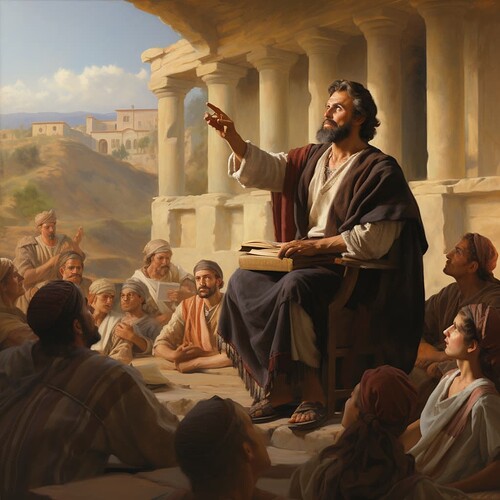![]() January 28: Romans 3-4: The Righteousness of Faith
January 28: Romans 3-4: The Righteousness of Faith
Embracing Grace through Faith
![]() Introduction
Introduction
On January 28th, our journey through the scriptures takes us to Romans 3-4, where the Apostle Paul dives deep into the core principles of faith and righteousness. These chapters underscore the transformative power of faith in God’s grace, moving beyond the law.
![]() Romans 3: The Righteousness through Faith
Romans 3: The Righteousness through Faith
Paul addresses the concept of righteousness in Romans 3, emphasizing that it comes from God through faith in Jesus Christ to all who believe. This chapter confronts the reality of human sin and the futility of trying to achieve righteousness through human effort.
![]() Key Verse: “For all have sinned and fall short of the glory of God, and all are justified freely by his grace through the redemption that came by Christ Jesus.” — Romans 3:23-24
Key Verse: “For all have sinned and fall short of the glory of God, and all are justified freely by his grace through the redemption that came by Christ Jesus.” — Romans 3:23-24
![]() Romans 4: Faith of Abraham
Romans 4: Faith of Abraham
In Romans 4, Paul uses the example of Abraham to illustrate that righteousness is credited through faith, not works. He shows how Abraham’s faith was counted as righteousness before the law was given, establishing the precedence of faith over legalistic observance.
![]() Key Verse: *“Abraham believed God,
Key Verse: *“Abraham believed God,
and it was credited to him as righteousness.” — Romans 4:3*
![]() Key Themes and Reflections:
Key Themes and Reflections:
The Universal Need for Grace: Romans 3 highlights that all have sinned, underscoring the universal need for God’s grace, irrespective of one’s background or efforts in following the law.
Justification by Faith: These chapters emphasize that righteousness comes through faith in Jesus Christ, not by adhering to the law. It’s a gift of grace that can’t be earned.
The Precedence of Faith: Using Abraham’s story, Paul demonstrates that faith has always been the basis of a righteous standing before God, even before the law was given.
![]() Today’s Application:
Today’s Application:
Reflect on the role of faith in your spiritual journey. Consider how relying on God’s grace, rather than your own efforts, can transform your relationship with God and your understanding of righteousness.
![]() Hidden Gem:
Hidden Gem:
Did you know? Romans 4:17 refers to God as the one “who gives life to the dead and calls into being things that were not,” revealing His power to transform and create anew.
![]() Reflective Q&A:
Reflective Q&A:
![]() Romans 3-4: Faith and Righteousness
Romans 3-4: Faith and Righteousness
![]() Understanding Justification by Faith: How does Paul’s explanation of justification by faith in Romans 3-4 challenge traditional views of righteousness?
Understanding Justification by Faith: How does Paul’s explanation of justification by faith in Romans 3-4 challenge traditional views of righteousness?
A: Paul’s teachings shift the focus from compliance with the law to a reliance on faith in Jesus Christ, emphasizing that righteousness is a gift of grace, not a result of human effort or merit.
![]() Learning from Abraham’s Faith: What can Abraham’s example teach us about the nature and power of faith?
Learning from Abraham’s Faith: What can Abraham’s example teach us about the nature and power of faith?
A: Abraham’s faith, counted as righteousness, exemplifies unwavering trust in God’s promises, showing that faith involves believing in God’s power and faithfulness, even when circumstances seem contrary.
![]() Join the Discussion:
Join the Discussion:
How do Romans 3-4 deepen your understanding of faith and righteousness? Share your reflections and insights in the comments below!
#Romans3 #Romans4 #Faith #Grace #Righteousness #BibleStudy #SpiritualJourney
![]() See You Tomorrow in Romans: Continue exploring the rich theological insights in the Book of Romans and their implications for our faith and daily living.
See You Tomorrow in Romans: Continue exploring the rich theological insights in the Book of Romans and their implications for our faith and daily living.
